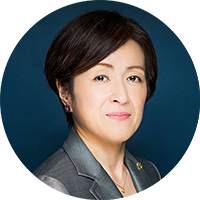Coach's VIEW is a business column authored by executive coaches in COACH A, aimed at providing valuable insights and effective approaches for leveraging coaching to foster organizational and leadership development. The column draws on the latest coaching trends and data, as well as insights from notable global publications on coaching.
Persuasive Power of Leaders to Make People Work

"Even if they smile, it does not mean that they agree with you."
"They will not complain, but they will also not take action."
"It is difficult to capture their true intentions."
You will often hear remarks like these in Thailand - the Land of Smiles.
While talking about the promotion of localization and an improvement in employee autonomy and independence, a Japanese leader is increasing the pace of his instructions and orders to somehow inspire the Thai employees standing dumbfounded in front of him who are unable to take action. The situation in which many employees are awaiting instructions continues.
There are many Japanese leaders who have fallen into this vicious cycle.
On the other hand, there are also leaders who have overcome such conditions and are steadily promoting reform.
What exactly is the difference between them?
First: They Persuade the Direct Subordinates in Front of Them
When relationships with their direct foreign subordinates are difficult in the country where they are stationed, what actions do many Japanese leaders have the tendency of falling into?
- Take action only with Japanese resident employees
- Ending with an explanation of policy to all employees without making a distinction between direct members and on-site employees
- Passing over troublesome direct members and only making contact with on-site employees
However, I noticed one thing while having talks in many companies.
Leaders working steadily and effectively on organizational reform are those that start by ensuring their direct subordinates take things seriously.
It does not matter whether their direct subordinates are Japanese or Thai. They invite and persuade the subordinates in front of them to reform.
* * *
I will now introduce Mr. M - the manager of the Thai base of an electric device manufacturer who has been successful in organizational reform.
Mr. M is a person attempting to achieve one year ahead of schedule for localization KPI. This realization by 2020 has been imposed on him by his head office in Japan.
When he was first appointed to the position four years ago, Mr. M only had relationships with on-site employees; he was not really involved with his direct subordinates.
There were reasons for that. He feared that he would offend his direct Thai subordinates who behaved like they controlled his department after working in the company for a long time. He had also not formed a cooperative relationship with the Japanese top management of the acquired company.
He complained to his superior in Japan one time. His superior said the following to him.
"If your subordinates worked as the company said in the first place, we would not need you."
Mr. M did not understand instantly what he had been told. However, the fog gradually parted and there was a moment when his role became clear.
"It is inevitable that my subordinates do not work voluntarily."
After hearing that, Mr. M realized that it would be best to start with him now if that was the case.
"My role is to translate and convey to my subordinates in an easy-to-understand manner what must be done. I must connect that to the actions of my subordinates, revise their actions and then make them initiate to achieve their goals. I will first work on the relationships for that purpose with the subordinates in front of me."
There are more than 800 people in the Thai base led by Mr. M. Excluding on-site operators, there are around 300 core employees.
Mr. M started by having thorough discussions about the company's 2020 vision with each of his five direct subordinates - consisting of four Thai people and one Japanese person.
"Just as when Momotaro chased out demons on Onigashima (a story in Japanese folklore), I invited my five subordinates to chase out our demons by using kibidango (sweet dumplings) or alcohol, by changing techniques and by changing things."
This is what Mr. M happily told me about that time.
He spent one year on continuing to invite and persuade the subordinates in front of him who he had kept on avoiding since directly after his appointment.
What Was the Next Technique for the Subordinates in Front of Mr. M?
When the five subordinates in front of him began to be inspired to work, Mr. M made the following request of them: "I hope that you will now ensure that each of your five subordinates is also inspired to work."
Mr. M. expressed his request and expectations by inviting and persuading the five subordinates in front of him to do the same for the five subordinates in front of them - just like he had continued to persuade them.
Two years later, I saw the start of what would become a joint Thai and Japanese corporate philosophy promotion committee with a proposal from the five subordinates in front of him and each of their five subordinates.
In fact, there is also a clue here.
There is data that says the following about bringing about reform to an organization: If 10% of the people have an unshakeable conviction in a community, most people will accept that reform.
There are 300 core employees in the company of Mr. M. That means that if there were around 30 reform leaders, it would be possible to move large mountains.
After that, Mr. M's company saw an increase in productivity and a decrease in its defect rate.
He was also able to promote three of the Thai people among the five subordinates in front of him to vacant director positions.
Just One Thing Is Necessary When Inviting and Persuading
What was it that Mr. M did to persuade the subordinates in front of him?
- It became possible to see the following points in a follow-up survey performed on Mr. M and his employees.
- Mr. M named meetings with newly appointed managers as "board meetings." He shared with them the tasks he had received from the head office. They then repeatedly discussed why they were necessary.
- He asked again and again and thoroughly discussed the things that his subordinates could not understand and the things they were not eager to do.
- He set aside time to thoroughly consider with the five subordinates in front of him what their leadership team should do to improve the motivation of all employees.
- When a problem occurred, he stopped investigating to determine its cause - "Why did that happen?" Instead, he asked again and again "How about we try this way?" or "Is there another method?" until they produced ideas.
- He continued to talk in easy-to-understand language about what is sought from everyone. For example, he would declare, "We are seeking speed rather than perfection."
- He would soon react by saying, "That's good!" to employees who took desirable actions.
He also did various other things.
However, above all, the thing that I personally found most impressive were the following words from a Thai person called Mr. K. He is the person considered by Mr. M as his own successor.
"The greatest change was that the five of us gave up: No matter how tough the situation was, Mr. M would not give up on or run away from continuing his relationships with the five of us."
He told me this with smiling.
Mamoru Itoh, the founder of COACH A, always says the following.
"The purpose of communication is to invite and persuade."
Mr. M had a strong desire to continue his relationships with the organization and its members without giving up. He also had the persuasive power to ensure that they take things seriously.
How many of your direct subordinates can you now ensure take things seriously as a leader?
How long do you think it will take you to ensure that 10% of your employees take things seriously?
Language: Japanese
*Regardless of profit, non-profit or intranet, secondary use such as copying, diversion, selling etc. is prohibited without permission.
Language: Japanese

